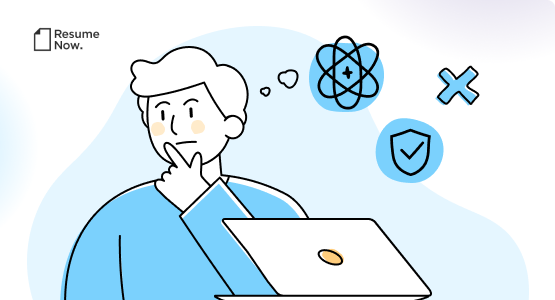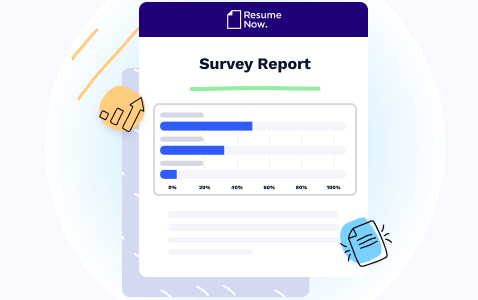Table of contents
A recent survey by Resume Now highlights the growing impact of AI on the workforce as AI job loss becomes a widespread concern, with 89% of workers concerned about their job security and 43% reporting that they know someone who has lost a job due to AI.
The 2025 AI Disruption Report reveals a rising wave of job anxiety, workplace bias, and the need for greater transparency and training in AI adoption. Based on responses from more than 1,000 U.S. workers surveyed in January 2025, the report provides a closer look at how AI-driven disruption is already reshaping industries and workforce dynamics.
So, what are the key concerns surrounding AI's role in the workforce, and how are workers responding to the challenges posed by automation and AI adoption?
Key Findings
- AI job loss is happening: 43% of workers know someone who has lost a job due to AI.
- AI anxiety is widespread: 89% of workers express concern about AI's impact on their job security, with 47% slightly worried, 34% moderately worried, and 8% extremely worried.
- AI's role in job displacement: 44% expect AI to take over some of their tasks within five years, while 20% believe AI could significantly reduce their role.
- Bias and discrimination fears: 63% believe AI adoption will introduce workplace bias affecting hiring and promotions.
- Workers want more transparency: 54% say their employer is only "somewhat transparent" about AI adoption plans.
- AI training gaps remain: While 56% receive role-specific AI training, only 38% feel fully supported in adapting to AI-driven workplace changes.
AI Job Displacement and Job Security Concerns Grow
AI-driven job displacement is no longer a distant possibility—it's a reality that's already impacting workers today. As automation and AI technologies continue to evolve, the consequences for job security are becoming increasingly evident. The data reveals a troubling trend:
- 43% report knowing someone who has lost a job due to AI.
- Only 4% report that neither they nor anyone they know has experienced AI-related job loss.
What this means: AI-driven job displacement is a growing concern for many workers, highlighting the need for employers to provide support through reskilling and upskilling programs. Clear communication about AI's impact on job roles will help employees navigate these challenges and better prepare for changes in the workforce.

Why Workers Are Worried About AI's Impact
As AI automation accelerates, workers are increasingly worried about its effects on job security and workplace dynamics. The data highlights several key concerns:
- AI creating a two-tiered workforce: 47%
- Over-reliance on AI reducing critical thinking: 37%
- Difficulty in reskilling workers for AI-driven roles: 37%
- Limited access to AI tools and training: 36%
- Lack of accountability for AI-generated decisions: 30%
- Dehumanization of work environments: 20%
- Potential misuse of AI for surveillance or data exploitation: 17%
- Job displacement: 10%
- Increased workload due to AI reliance: 9%
- Ethical concerns: 5%
- Loss of human creativity and decision-making: 4%
While 69% of workers believe AI will create more jobs than it destroys, 23% fear AI will result in net job losses, reflecting ongoing uncertainty about how AI will reshape industries in the coming years.
What this means: As AI continues to shape industries, workers are seeking reassurance and greater support from employers. Addressing concerns through transparency, training, and ethical AI implementation is crucial for maintaining employee trust and morale.
Bias, Transparency, and the Need for Employer Accountability
AI's role in hiring and workforce management continues to raise concerns about bias and fairness:
- 63% of workers believe AI-driven hiring processes will introduce workplace discrimination or bias.
- 54% feel their employer is only "somewhat transparent" about AI adoption plans.
- 41% say their employer is "very transparent."
- Only 5% report that their employer is not transparent at all.
What this means: Employees are looking for greater transparency from employers about how AI is being integrated into hiring and management processes. Clear communication about AI's role and its potential biases is essential for building trust and ensuring fairness in the workplace.
How Workers Are Adapting to AI in the Workplace
Despite concerns about AI, workers are actively taking steps to future-proof their careers. Many are becoming more proactive about acquiring the skills needed to thrive in an AI-driven workplace:
- 55% are researching AI-related skills on their own.
- 42% have enrolled in AI-related courses or training.
- 68% use AI to write resumes, and 67% use AI to craft cover letters.
However, employer-provided training remains insufficient:
- 56% receive role-specific AI training, yet only 38% feel fully supported in adapting to AI-driven workplace changes.
- 21% want more guidance on working alongside AI.
What this means: Workers are demonstrating initiative by seeking AI training and resources on their own, but employers need to step up. Providing more comprehensive, role-specific training and clear guidance on integrating AI into daily work will help employees feel more confident and prepared for the future.
What Workers Want From Employers
As AI continues to reshape the workplace, employees are calling for more support from employers to help them navigate these changes. Key employee needs include:
- 55% want transparency about AI's role in their company.
- 50% want opportunities to provide feedback on AI integration.
- 48% seek more comprehensive AI training.
What this means: Workers are looking for greater clarity and involvement in how AI is integrated into their roles. Employers who offer transparency, opportunities for feedback, and robust training programs will help employees adapt more effectively to the evolving workplace and ensure they feel valued in the process.
Looking for a change of scenery? Our Resume Builder can help you land a new role by creating or updating your resume to meet the standards of the competitive job market.
Methodology:
The findings provided were gathered through a survey conducted with 1,023 American workers on January 21, 2025. Participants were queried about their job security concerns, experiences with AI-related job displacement, and perceptions of AI's role in hiring and workplace dynamics. Participants responded to various question types, including yes/no questions, open-ended questions, scale-based questions gauging agreement levels, and questions that permitted the selection of multiple options from a list of answers.
For press inquiries, contact Joseph Santaella at joseph.santaella@bold.com.
Was this information helpful? Let us know!
Keith is a Career Expert and content contributor for Resume Now. He is a Certified Professional Resume Writer (CPRW) with over a decade of experience in the career development field. Keith also holds a Master's of Education from Cabrini University.
More resources

11 High-Paying Jobs That Are Less Stressful AND Flexible
Leave your stress behind with a high-paying low-stress work-fr...

AI Compliance Crisis: 57% Concerned About Unclear AI Policies at Work
Resume Now examines growing concerns amongst workers regarding...
![How to Write Education Section on a Resume in 2025 [+ Examples] How to Write Education Section on a Resume in 2025 [+ Examples]](/sapp/uploads/2021/11/how-to-write-the-education-section-of-a-resume.jpg)
How to Write Education Section on a Resume in 2025 [+ Examples]
As seen in 1Foot Note Table of contents Create your resumeGet ...

Graphic Designer Resume: Examples & Templates for 2025
Was this information helpful? Let us know &star &star &star &s...

Engineering Manager Resume: Examples, Templates & Tips for 2025
Was this information helpful? Let us know &star &star &star &s...

Hotel Manager Resume: Examples, Templates and Tips for 2025
Need a hotel manager resume that lands you an interview in 202...
